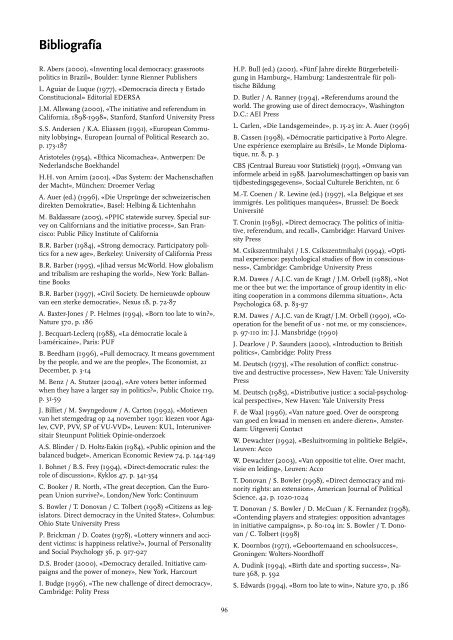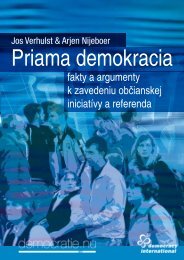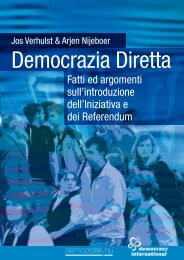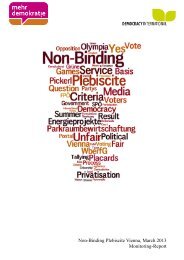hechos y argumentos sobre la introducción de la iniciativa y el ...
hechos y argumentos sobre la introducción de la iniciativa y el ...
hechos y argumentos sobre la introducción de la iniciativa y el ...
Create successful ePaper yourself
Turn your PDF publications into a flip-book with our unique Google optimized e-Paper software.
Bibliografía<br />
R. Abers (2000), «Inventing local <strong>de</strong>mocracy: grassroots<br />
politics in Brazil», Boul<strong>de</strong>r: Lynne Rienner Publishers<br />
L. Aguiar <strong>de</strong> Luque (1977), «Democracia directa y Estado<br />
Constitucional» Editorial EDERSA<br />
J.M. Allswang (2000), «The initiative and referendum in<br />
California, 1898-1998», Stanford, Stanford University Press<br />
S.S. An<strong>de</strong>rsen / K.A. Eliassen (1991), «European Community<br />
lobbying», European Journal of Political Research 20,<br />
p. 173-187<br />
Aristot<strong>el</strong>es (1954), «Ethica Nicomachea», Antwerpen: De<br />
Ne<strong>de</strong>r<strong>la</strong>ndsche Boekhan<strong>de</strong>l<br />
H.H. von Arnim (2001), «Das System: <strong>de</strong>r Machenschaften<br />
<strong>de</strong>r Macht«, München: Droemer Ver<strong>la</strong>g<br />
A. Auer (ed.) (1996), «Die Ursprünge <strong>de</strong>r schweizerischen<br />
direkten Demokratie«, Bas<strong>el</strong>: H<strong>el</strong>bing & Lichtenhahn<br />
M. Baldassare (2005), «PPIC statewi<strong>de</strong> survey. Special survey<br />
on Californians and the initiative process», San Francisco:<br />
Public Pilicy Institute of California<br />
B.R. Barber (1984), «Strong <strong>de</strong>mocracy. Participatory politics<br />
for a new age», Berk<strong>el</strong>ey: University of California Press<br />
B.R. Barber (1995), «Jihad versus McWorld. How globalism<br />
and tribalism are reshaping the world», New York: Bal<strong>la</strong>ntine<br />
Books<br />
B.R. Barber (1997), «Civil Society. De hernieuw<strong>de</strong> opbouw<br />
van een sterke <strong>de</strong>mocratie», Nexus 18, p. 72-87<br />
A. Baxter-Jones / P. H<strong>el</strong>mes (1994), «Born too <strong>la</strong>te to win»,<br />
Nature 370, p. 186<br />
J. Becquart-Leclerq (1988), «La démocratie locale à<br />
l›américaine», Paris: PUF<br />
B. Beedham (1996), «Full <strong>de</strong>mocracy. It means government<br />
by the people, and we are the people», The Economist, 21<br />
December, p. 3-14<br />
M. Benz / A. Stutzer (2004), «Are voters better informed<br />
when they have a <strong>la</strong>rger say in politics», Public Choice 119,<br />
p. 31-59<br />
J. Billiet / M. Swyngedouw / A. Carton (1992), «Motieven<br />
van het stemgedrag op 24 november 1991: kiezen voor Agalev,<br />
CVP, PVV, SP of VU-VVD», Leuven: KUL, Interuniversitair<br />
Steunpunt Politiek Opinie-on<strong>de</strong>rzoek<br />
A.S. Blin<strong>de</strong>r / D. Holtz-Eakin (1984), «Public opinion and the<br />
ba<strong>la</strong>nced budget», American Economic Review 74, p. 144-149<br />
I. Bohnet / B.S. Frey (1994), «Direct-<strong>de</strong>mocratic rules: the<br />
role of discussion», Kyklos 47, p. 341-354<br />
C. Booker / R. North, «The great <strong>de</strong>ception. Can the European<br />
Union survive», London/New York: Continuum<br />
S. Bowler / T. Donovan / C. Tolbert (1998) «Citizens as legis<strong>la</strong>tors.<br />
Direct <strong>de</strong>mocracy in the United States», Columbus:<br />
Ohio State University Press<br />
P. Brickman / D. Coates (1978), «Lottery winners and acci<strong>de</strong>nt<br />
victims: is happiness re<strong>la</strong>tive», Journal of Personality<br />
and Social Psychology 36, p. 917-927<br />
D.S. Bro<strong>de</strong>r (2000), «Democracy <strong>de</strong>railed. Initiative campaigns<br />
and the power of money», New York, Harcourt<br />
I. Budge (1996), «The new challenge of direct <strong>de</strong>mocracy»,<br />
Cambridge: Polity Press<br />
H.P. Bull (ed.) (2001), «Fünf Jahre direkte Bürgerbeteiligung<br />
in Hamburg«, Hamburg: Lan<strong>de</strong>szentrale für politische<br />
Bildung<br />
D. Butler / A. Ranney (1994), «Referendums around the<br />
world. The growing use of direct <strong>de</strong>mocracy», Washington<br />
D.C.: AEI Press<br />
L. Carlen, «Die Landsgemein<strong>de</strong>», p. 15-25 in: A. Auer (1996)<br />
B. Cassen (1998), «Démocratie participative à Porto Alegre.<br />
Une expérience exemp<strong>la</strong>ire au Brésil», Le Mon<strong>de</strong> Diplomatique,<br />
nr. 8, p. 3<br />
CBS (Centraal Bureau voor Statistiek) (1991), «Omvang van<br />
inform<strong>el</strong>e arbeid in 1988. Jaarvolumeschattingen op basis van<br />
tijdbestedingsgegevens», Sociaal Cultur<strong>el</strong>e Berichten, nr. 6<br />
M.-T. Coenen / R. Lewine (ed.) (1997), «La B<strong>el</strong>gique et ses<br />
immigrés. Les politiques manquées», Bruss<strong>el</strong>: De Boeck<br />
Université<br />
T. Cronin (1989), «Direct <strong>de</strong>mocracy. The politics of initiative,<br />
referendum, and recall», Cambridge: Harvard University<br />
Press<br />
M. Csikszentmihalyi / I.S. Csikszentmihalyi (1994), «Optimal<br />
experience: psychological studies of flow in consciousness»,<br />
Cambridge: Cambridge University Press<br />
R.M. Dawes / A.J.C. van <strong>de</strong> Kragt / J.M. Orb<strong>el</strong>l (1988), «Not<br />
me or thee but we: the importance of group i<strong>de</strong>ntity in <strong>el</strong>iciting<br />
cooperation in a commons dilemma situation», Acta<br />
Psychologica 68, p. 83-97<br />
R.M. Dawes / A.J.C. van <strong>de</strong> Kragt/ J.M. Orb<strong>el</strong>l (1990), «Cooperation<br />
for the benefit of us - not me, or my conscience»,<br />
p. 97-110 in: J.J. Mansbridge (1990)<br />
J. Dearlove / P. Saun<strong>de</strong>rs (2000), «Introduction to British<br />
politics», Cambridge: Polity Press<br />
M. Deutsch (1973), «The resolution of conflict: constructive<br />
and <strong>de</strong>structive processes», New Haven: Yale University<br />
Press<br />
M. Deutsch (1985), «Distributive justice: a social-psychological<br />
perspective», New Haven: Yale University Press<br />
F. <strong>de</strong> Waal (1996), «Van nature goed. Over <strong>de</strong> oorsprong<br />
van goed en kwaad in mensen en an<strong>de</strong>re dieren», Amsterdam:<br />
Uitgeverij Contact<br />
W. Dewachter (1992), «Besluitvorming in politieke B<strong>el</strong>gië»,<br />
Leuven: Acco<br />
W. Dewachter (2003), «Van oppositie tot <strong>el</strong>ite. Over macht,<br />
visie en leiding», Leuven: Acco<br />
T. Donovan / S. Bowler (1998), «Direct <strong>de</strong>mocracy and minority<br />
rights: an extension», American Journal of Political<br />
Science, 42, p. 1020-1024<br />
T. Donovan / S. Bowler / D. McCuan / K. Fernan<strong>de</strong>z (1998),<br />
«Contending p<strong>la</strong>yers and strategies: opposition advantages<br />
in initiative campaigns», p. 80-104 in: S. Bowler / T. Donovan<br />
/ C. Tolbert (1998)<br />
K. Doornbos (1971), «Geboortemaand en schoolsucces»,<br />
Groningen: Wolters-Noordhoff<br />
A. Dudink (1994), «Birth date and sporting success», Nature<br />
368, p. 592<br />
S. Edwards (1994), «Born too <strong>la</strong>te to win», Nature 370, p. 186<br />
96










